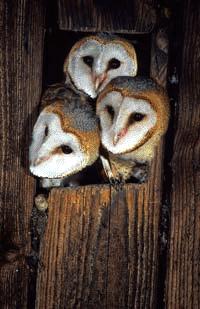
Young barn owls waiting for the return of a parent with prey. Fluctuations in weather and the environment affect survival and reproduction of animals. But are all individuals within a population equally susceptible? Theory on the evolution in age-structured populations suggests not – those life stages that are more important for overall fitness should be less susceptible to environmental variation than other life stages.
Empirical support for this prediction is rare because detailed data need to be collected over many years, and true variation tends to be inflated through the way in which natural populations are sampled.
In the January issue of The American Naturalist, Res Altwegg (University of Cape Town and University of Victoria), Michael Schaub (Swiss Ornithological Institute and University of Bern), and Alexandre Roulin (University of Lausanne), examined temporal variation in survival and reproduction of barn owls in western Switzerland that had been observed over the past fifteen years. Using recently developed statistical tools, they were able to show that those fitness components that experienced stronger selection were indeed less variable over the years.
"Our results help explain why certain age classes are more susceptible to adverse weather, and they will help us understand how climatic variation affects populations of organisms in nature. This is important for predicting the effect of climate change on populations," the authors said. Source : University of Chicago Press Journals
 Print Article
Print Article Mail to a Friend
Mail to a Friend
